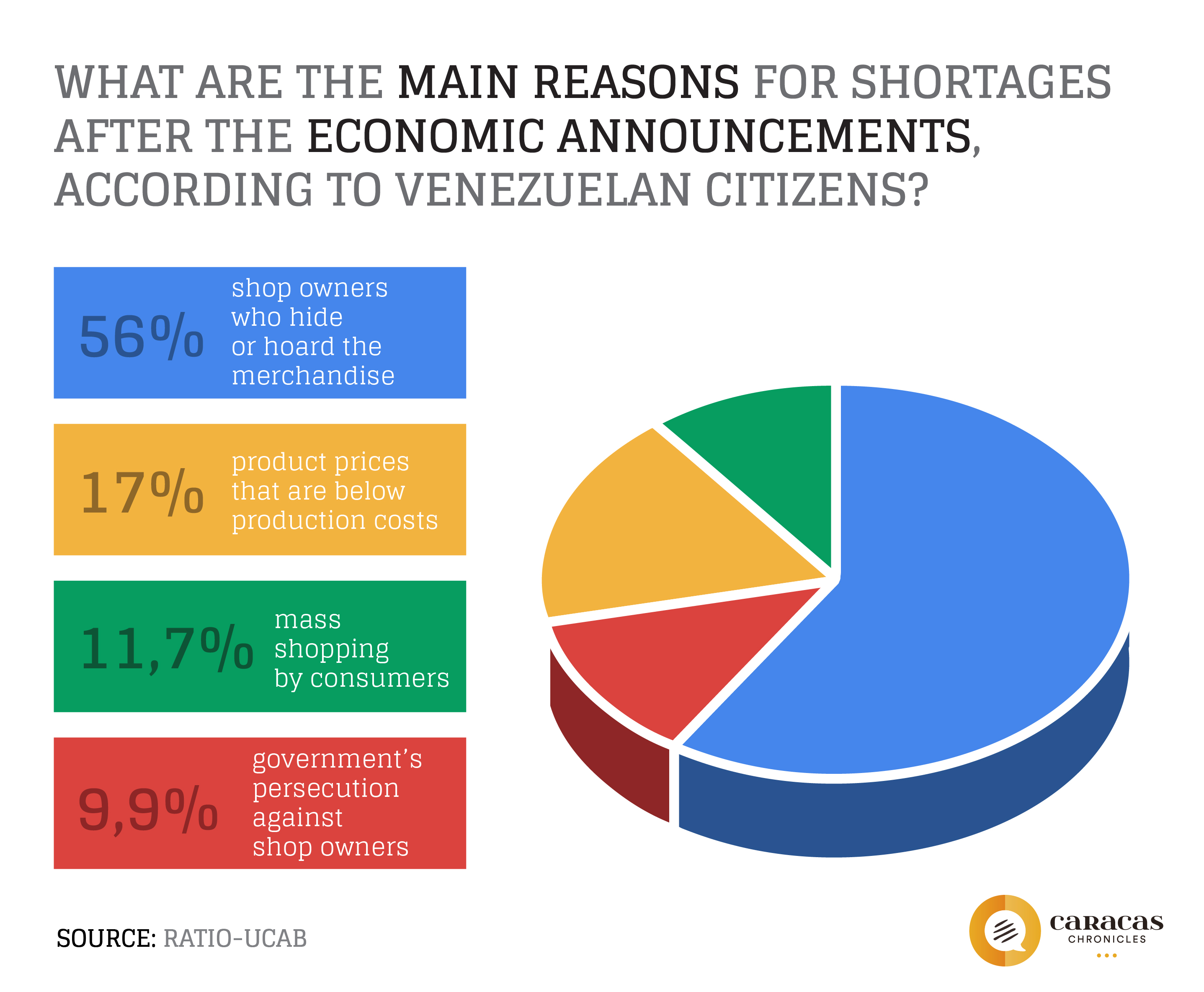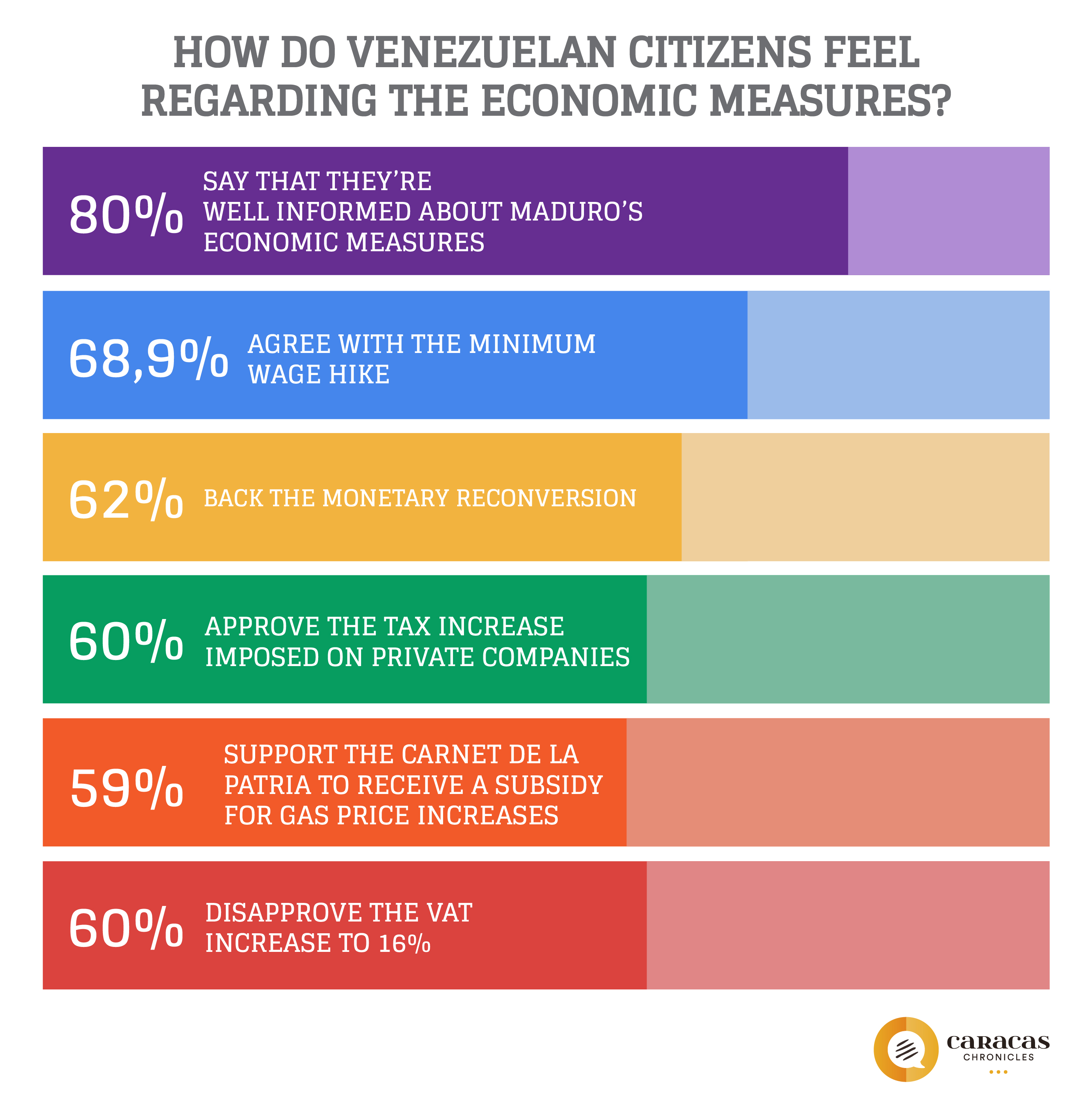Maduro Wins the Public Opinion Battle Against Reality Itself
Since they control most of the media and Venezuelans don’t have access to the news or different points of view, the regime can fabricate and spread a convenient narrative. This is how poorly informed citizens answered questions about the economic measures.


Photo: retrieved
Many Venezuelans only have access to the information the government provides. According to recent studies on public opinion, an important number of citizens only see and hear the propaganda of Nicolás Maduro’s regime, and the economic announcements of August 17, with the perception most people have of their possible efficacy, are the evidence of it.
Economists have repeatedly explained the mistakes and inconsistencies in said announcements but, although the last study by Ratio-UCAB says that 75% of Venezuelans keep thinking that the country’s doing badly or very badly, the assessment for September shows that, for the first time in two years, most people stopped seeing the situation as “very bad.” In July 2018 (a month before Maduro’s economic announcements), 46% of citizens described the country’s situation as “very bad.” By September, this group had dropped to 29%. We’d need to go back to November 2015 in the pollsters’ records to find a similar number.
 Studies made by More Consulting also offer similar conclusions, showing Maduro’s best approval ratings in over two years: 8.7% of citizens describe Maduro’s administration as “excellent,” while 14.9% say it’s “good.” 18% tends to consider it “regular to good.”The situation’s the same if we consider how citizens answered questions about their day to day experience. Only 14% think that their life is “very bad,” a figure that’s only mirrored by that of March 2016. In July this year, before the economic announcements, 25% of citizens said their personal situation was “very bad.”
Studies made by More Consulting also offer similar conclusions, showing Maduro’s best approval ratings in over two years: 8.7% of citizens describe Maduro’s administration as “excellent,” while 14.9% say it’s “good.” 18% tends to consider it “regular to good.”The situation’s the same if we consider how citizens answered questions about their day to day experience. Only 14% think that their life is “very bad,” a figure that’s only mirrored by that of March 2016. In July this year, before the economic announcements, 25% of citizens said their personal situation was “very bad.”
Maduro’s slight climb in approval is associated with citizens who saw his performance as “bad or regular to bad” in June, and who describe it as “regular to good” after the announcements of August 17.
Even if we observe the data for political self-definition, we discover that the perception dissidents have about the country is (naturally) quite different to that of chavistas, but it also shows few similarities with that of independents.
An important number of citizens only see and hear the propaganda of Nicolás Maduro’s regime.
According to More Consulting’s study, 47% of Venezuelans describe themselves as “independents disillusioned with both opposition and chavista politicians.” On the other hand, 24% say they’re chavistas and 27.4% say they’re opposition.
If we analyze the approval rating for Maduro’s administration by self-definition, we find that 31% of those who describe themselves as chavistas say (after the economic announcements) that the administration is “excellent,” while 37.4% say “it’s good.” 23.9% say it’s “regular to good.”
In the case of independents, perception is far more scattered: 35% of independents see Maduro’s performance as “good.” Among dissidents, 65.7% say the performance is “terrible,” while 17% say it’s “bad” and 9% describe it as “regular to bad.”
The opposition’s worst moment
The political self-definition found in Ratio-UCAB’s study suggests that 36.6% of citizens define themselves as independents, 32.5% say they’re chavistas and 30.9% say they’re opposition. In the last segment, we have the lowest result since January 2017, when 33.7% of citizens said they opposed Maduro’s government. There’s even a breaking point in political self-definition of dissidents and independents due to the new economic measures.
Before, 49.6% of citizens said they opposed the government and only 19% described themselves as independents. After the announcements, we detect a movement from the opposition segment to the independents group.
 80% of Venezuelans also say that they’re well informed about Maduro’s economic measures, according to that same study. 68.9% say they agree with the minimum wage hike, 59% say they support the carnet de la patria to receive a subsidy for gas price increases, 62% backs the monetary reconversion (scrapping five zeroes off the currency) and 60% approves the tax increase imposed on private companies.
80% of Venezuelans also say that they’re well informed about Maduro’s economic measures, according to that same study. 68.9% say they agree with the minimum wage hike, 59% say they support the carnet de la patria to receive a subsidy for gas price increases, 62% backs the monetary reconversion (scrapping five zeroes off the currency) and 60% approves the tax increase imposed on private companies.
The only measure that has no support is the VAT increase to 16%. In this case, 60% of citizens disapprove.
What will be the result of these measures? 23% say they’ll solve hyperinflation, while 25% say they’ll solve shortages. 7% declined to respond.
If we consult the perception of citizens about the impact of the economic measures, the results show a triumph for regime propaganda.
In the Ratio-UCAB study, citizens are given four reasons for shortages after the economic announcements. Out of the four options, 56% blame the absence of products on “shop owners who hide or hoard” the merchandise, and 11.7% blame it on the mass shopping of consumers. Only 17% say that shortages are caused “by product prices that are below production costs,” while 9.9% say that shortages are the consequence “of the government’s persecution against shop owners.”
On the other hand, if we consult the perception of citizens about the impact of the economic measures, the results show a triumph for regime propaganda: 18% of citizens say that the country’s problems will be solved, while 51% say that it’s possible they’ll be solved, but it requires patience.
Only 28% are convinced that the measures will fail.
Nicolás Maduro is definitely winning the battle for the perception of public opinion, given the lack of different narratives, other than those offered by regime propaganda. If we’re to take a positive spin on this, it’s the opportunity the scenario provides for those wishing to reach the people.
Caracas Chronicles is 100% reader-supported.
We’ve been able to hang on for 22 years in one of the craziest media landscapes in the world. We’ve seen different media outlets in Venezuela (and abroad) closing shop, something we’re looking to avoid at all costs. Your collaboration goes a long way in helping us weather the storm.
Donate




